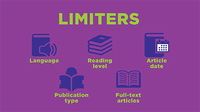Keyword vs. Subject Search
What's the difference between a keyword and subject search?
Watch the Advanced Searching: Limiters & Subject Searching video tutorial, explore the table to learn about keyword vs. subject searches, and then review the screenshots at the bottom of the page.
| Keyword | Subject |
|---|---|
| Keyword searches are used for finding information in search engines, databases, and online catalogs | Subject searches are used for finding information in databases and online catalogs |
| Keywords are natural language, or words you would come up with on your own to describe the type of information you need for your research topic. | Subject headings are assigned by editors. The subjects indicate what the article is about. This is called controlled vocabulary because the editor assigns subjects by picking from a predetermined list so that all articles on the same subject get found by the same search. |
| In a keyword search, for example, to find all articles related to cars, you should search for "cars" and search for "automobiles." That is because someone could have written about the topic and only used one of the words. If you only search for "cars," you might miss an excellent article or source that only mentioned the word "automobiles." | In a subject search, for example, to find all articles related to cars, use the subject term called automobiles. An editor will have assigned the term "automobiles" even if an article or source only mentions the word car. Therefore, you will find all articles or sources about cars even if the article or source did not use the term "cars." |
| For a keyword search in a database, the system searches articles' titles, abstracts (summaries), and the first several sentences for the keyword/s you entered. In an online catalog, a keyword search usually searches the entire record. | For a subject search in a database or online catalog, the system searches the list of subject headings to match records to the terms you entered. |
| Keyword searches are the default search in many databases and online catalogs. | For subject searches, you may need to use advanced search to find the option to search by subject. |
| Keyword advantage: You do not have to know special or controlled vocabulary (like subject headings). | Subject disadvantage: You have to know the special or controlled vocabulary. Many databases offer a link to their list of subject headings, which they call a thesaurus. You can check the thesaurus to find out what subject heading to use for your search. |
| Keyword disadvantage: Your keyword/s could show up one time in an article even though that article is really about a different subject. That means you will probably get many irrelevant results in your list. You will have to review the longer list to find the best results. | Subject advantage: Subject searches tend to give you more relevant results. This means that your results tend to match what you need, and you should have fewer results in your list that do not pertain to what you need. |
Tip: Once you do a keyword search, go through your search results and find one or two excellent articles or sources. Look at the subject headings that were assigned to those sources, and do a new search using those terms.
These screenshots from real databases show where to find keyword and subject search options.
- In this database, the default option is a keyword search, but you can change to a subject search from the regular search box by clicking on the arrow.

- In this database, the default option is also a keyword search. Click on Advanced Search (step 1) and then click on the arrow next to the label called Keyword to change the search option to Subject (step 2).
Step 1:
Step 2:
| Educator Content There is currently no educator content for this page. |
|
Do you want to share this page with students, but you don't want students to see the Educator Content section? Share this link instead of the URL at the top of the page: |


